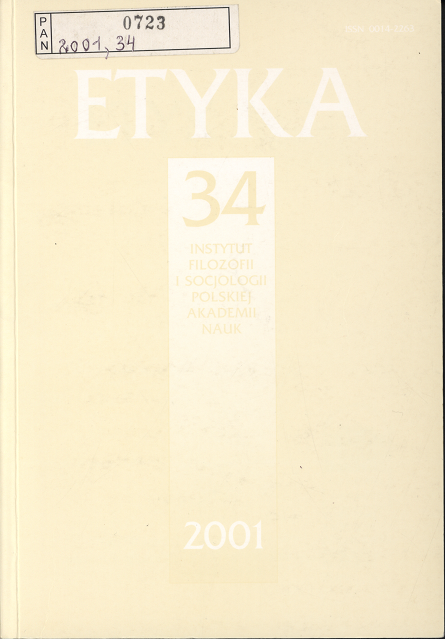Terroryzm i religia
DOI:
https://doi.org/10.14394/etyka.662Abstrakt
The Twin Towers were destroyed by Muslim fanatics. Their inability to perceive the repulsive aspect of their act is remarkable and requires a philosophical interpretation. Obviously, religious beliefs can not be tested on empirical grounds or by logical arguments. On the other hand it would be wrong to assume that every religious conviction is as credible as any other. The author tries to separate innocuous religious beliefs from insane claims by arguing that the most reliable criterion of religious plausibility can be derived from Plato’s Phaedrus and the story of two horses, one white and one black, pulling the chariot of our souls. The white horse stands for saintliness, the black for sin. One can not do much more to make the distinction between the safe and uplifting aspect of religion and the dangerous and irresponsible aspect of faith more precise and specific. Terrorism is a deviation that arises within a religion where this distinction has been completely confused, where goodness is identified with a blind and unconditional submission to one group of religious adherents and evil with distancing oneself from the group. Social and political loyalty has replaced religious loyalty. So narrow an interpretation of can not be reconciled with an impartial concept of sin and righteousness.Downloads
Pobrania
Opublikowane
2001-12-01
Jak cytować
Hołówka, Jacek. 2001. „Terroryzm I Religia”. Etyka 34 (grudzień). Warsaw, Poland:9-30. https://doi.org/10.14394/etyka.662.
Numer
Dział
Artykuły
Licencja
Prace publikowane w czasopiśmie ETYKA udostępniane są na podstawie licencji Creative Commons Attribution 4.0 International (CC BY 4.0). Oznacza to, że Autorki i Autorzy zachowują autorskie prawa majątkowe do utworów i wyrażają zgodę, aby ich prace były zgodnie z prawem ponownie wykorzystywane do dowolnych celów, także komercyjnych, bez konieczności uzyskania uprzedniej zgody ze Autora lub wydawcy. Artykuły mogą być pobierane, drukowane, powielane i rozpowszechniane z zastrzeżeniem konieczności poprawnego oznaczenia autorstwa oraz oryginalnego miejsca publikacji. Autorzy zachowują prawa autorskie do wspomnianych utworów bez innych ograniczeń.



